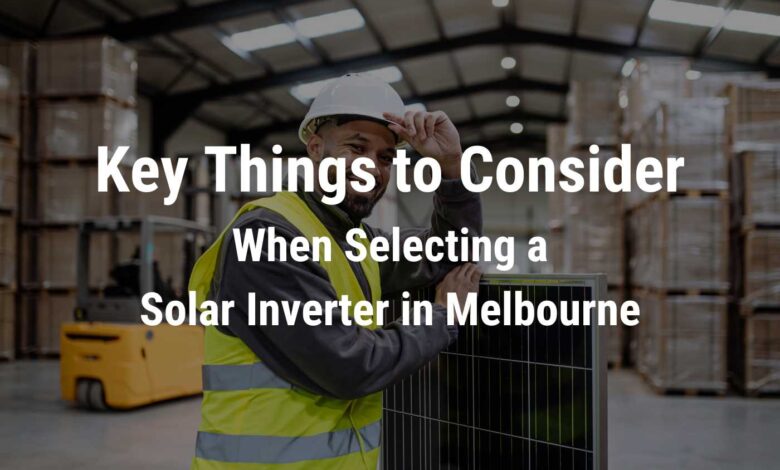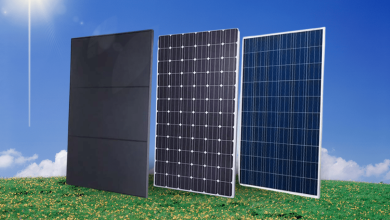Key Things to Consider When Selecting a Solar Inverter in Melbourne

For some manufacturers of inverters, the increasing population of households in Melbourne going solar has chosen the right inverter for an installation possibly one of the most important choices that one thinks of in maximizing the efficiency of a solar system. Whereas choosing the best solar panels from among the different technologies and brands to ensure one gets good power and performance values draws considerably more relative attention, an inverter is equally important in your setup.
Key Considerations In Choosing A Solar Panel Inverter For Your Melbourne Home
Before you deep dive into the selection criteria, here’s to coming to terms with what an inverter does.
Key functions of solar inverters:
- Converts DC electricity created from solar modules to AC electricity that can power the home.
- Monitoring the system’s performance and Acting as a safety tool through the addition of features like rapid shutdown.
- These are the brains of the system and what powers them should be chosen carefully to round up your solar system for the best performance.
There are three basic types of inverters, each suiting different setups and homeowner needs well. String inverters, Microinverters, Power optimizers, Hybrid inverters
All of the above have their benefits. The best option for you is a choice you make based on your situation and needs.
Efficiency Ratings
Inverter efficiency becomes directly related to the total output of your solar system. The factors that entail efficiency such as Conversion efficiency (DC to AC), European efficiency rating CEC efficiency rating.
It is recommended to look for high-efficiency ratings for inverters. This is because the efficiency ratings directly determine how much power you will be able to harness from your best solar panels.
Power Rating and Capacity
It is paramount to ensure that the inverter you have can be underrated to support all the output carried from the solar panel.
Power Rating Considerations
- It will be very important that the sizing or capacity of the inverter is matched with the size of the solar panel array, has the potential to get a bit larger somewhere in the future, and also considers the range in the DC input voltage.
- Appropriate sizing is what will determine the best performance and lifespan of your solar system.
Solar Panel Compatibility
Inverters are not compatible with all types of solar panels includes:
- Solar panel compatibility considerations, Voltage, and current ratings, Panel technology (e.g., mono vs. polycrystalline), and Warranty.
- Inverters have much shorter operating lives than solar panels, so the warranty is huge.
Warranty Considerations :
The longer the warranty on a product, the longer the warranty on performance specifications
At the end of the warranty period, you may feel relieved if your inverter company has a good reputation for warranty, which may also protect your investment.
Smart Features and Monitoring
All new features of the inverter that you had quoted and installed.
Smart Desirable Features:
- Real-time performance monitoring.
- helps in Leading in the industry in mobile app-integrated
- Energy consumption analysis
- Remote troubleshooting features
All of the above helps ensure the best possible performance of the system with an early identification of faults.
Grid Connection Requirements
There are certain requirements of the grid-connected solar system in Melbourne.
Key Requirements of Grid Connection:
- All needs that are local AS/NZS 4777.2 standards
- Voltage and frequency trip limits
- Anti-Islanding protection
Your favorite inverter should meet the AS/NZS 4777.2 standards at the local level, such that it will hurry up no time in the time of the installation process.
Battery Ready Compatibility
If you are considering a plan of buying a solar panel and battery package you need inverter compatibility.
Battery Integration Points to Consider:
Not only this, but also AC or DC coupling of storage
- Compatibility with other models of batteries
- Charging and discharging rates
- Is it programmable for any energy management?
Choose an inverter that is completely compatible with your existing and future mindset about battery storage.
Brand reputation and service
- Buy from the best brand to ensure good performance and system support.
- Look for these parameters
- The company’s history in solar technology
- Brand rating
- Look at various ratings and have a close look to see what is behind the ratings.
Warranty and Long-Term Investment
- Customer reviews and ratings
- Local support and service availability
- Replacement part availability
For example, replacement parts will be easier to get, and local support will be more available for a big brand, which in turn means better long-term investment.
Environmental Considerations
The weather may take some toll on the inverter’s performance and life in Melbourne.
- Acceptable range of temperature
- IP rating (dust and water)
- Efficacy of the cooling system
Installation location: indoors and outdoors, use an inverter that will be best suited to the variable weather in Melbourne.
Future-Proof Your System
When selecting an inverter, consider future upgrades to maximize your investment. Look for options that allow for additional solar panels, access to new technologies, and firmware upgrades. Ensure compatibility with home automation systems, as an upgradable inverter will enhance your system’s efficiency and adaptability. This foresight can significantly reduce costs and improve performance over time.
Cost-Value Comparison
When selecting an inverter, consider the overall cost-value rather than just the upfront price. Compare lifetime costs, including energy savings and long-term maintenance or replacement expenses. Assess the impact on system-wide efficiency, as investing in a higher-quality, more expensive inverter often proves to be more economical in the long run, providing better performance and savings over its lifespan.
Installation and Maintenance
When evaluating inverter installation and maintenance, consider factors such as ease of installation and maintenance, operational noise levels, and the space required for the system. These elements significantly impact your experience with the solar system, not only as a first-time user but also in the years to come. A well-planned installation ensures long-term satisfaction and efficiency.
Export Limitations
In Melbourne, for instance, there are local laws and regulations regarding the supply of export of extra solar energy back to the grid.
- Export limit control considerations
- inverter control export limit.
- Dynamic controls for export
- Local compliance in energy that is exported
Ensure that the inverter can control the energy exported to operate within local principles of energy export.
The choice of a high-quality inverter makes all the difference in the best solar panels vis-à-vis all other installations and thus assures one of securing their solar investment over the long term. Key things Melbourne homeowners should keep in mind to make an informed decision in striking a balance between efficiency, compatibility, and long-term value include:
Better inverter selection, either in new system installation or upgrading of the existing system, is a choice you make to ensure a good solar experience. Be sure to consult some reputable and respectable solar installers and go through the following to make your final selection:. It is, therefore, a perfect inverter that will give the right output on efficiency, effectiveness, and inexpensive operation in the solar panel and battery package for quite some good years to come.
Note: Here are the Vital Things to Know Before Investing In Solar Panels





